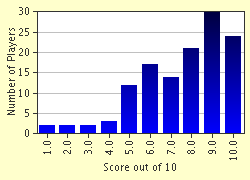Quiz Answer Key and Fun Facts
1. When the author gives some background or needed details to the story this is known as what term?
2. What element of a short story might be described as the 'series of related events'?
3. Only people can be characters in a story.
4. The second person point of view is the same as the omniscient point of view.
5. If I told you this short story takes place in a jungle on a mysterious island sometime in the 1930s/1940s involving an eccentric hunter, I would be describing what aspect of the story?
6. Which is the correct term for what could be described as the "turning point of the story"?
7. In Maupassant's short story "The Necklace", the main character learns that honesty is indeed the best policy. The main idea or the possible opinion of the author is known as what term?
8. The problem of the plot is also known as which short story element?
9. What is the purpose of the short story's title?
10. What is another word for any hints of future plot occurrences?
Source: Author
57wordsmith
This quiz was reviewed by FunTrivia editor
MotherGoose before going online.
Any errors found in FunTrivia content are routinely corrected through our feedback system.


